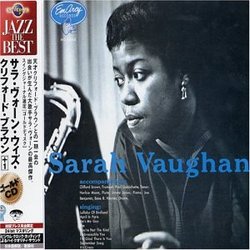Vaughan and Brown "speak" the same language on this CD.
Mary Whipple | New England | 09/17/2006
(5 out of 5 stars)
"This 2003 release of Vaughan's December, 1954, album (previously released in 1991 as "Sarah Vaughan with Clifford Brown") is one of her most brilliant collaborations and a fine memorial to the work of Brown, who died eighteen months after recording this, at age twenty-six. With Brown on trumpet, Paul Quinichette on tenor sax, Jimmy Jones on piano, Roy Haynes on drums, and Herbie Mann on jazz flute, the album is a sophisticated partnership among musicians, all of whom are thinking of the whole sound and the whole effect, rather than their own star turns. The mood varies from light to poignantly tender, the tempo is usually slow, and the volume is kept low, highlighting the creativity of each performer's variations while remaining true to the songs and their meanings.
"Lullaby of Birdland" is lightly swingy in Vaughan's hands, with minimal accompaniment and a restrained mood. Vaughan's voice ranges widely, with a lovely contrast between her lowest range and the flute of Mann, as Brown plays a muted trumpet and remains in the background. "April in Paris" is sweetly tender, with Vaughan hesitating as she asks "What have you done to my heart," her accompanists keeping their solos soft. Both "Embraceable You" and "September Song," slow-tempo songs long associated with Vaughan, allow for much improvisation and highlight Vaughan's enormous range while allowing Brown to soar. The "partial alternative take" of "Lullaby of Birdland" features Vaughan's best scat.
"Jim" and "I'm Glad There Is You" are personal favorites. "Jim," a narrative revealing the intimacy of a relationship in which the woman declares she will continue to love a man who will leave her, begins with a duet, Brown's trumpet so close to the timbre of Vaughan's voice that it sounds like another voice, while his later solo, louder than usual, conveys the passion of the song. "I'm Glad There is You" also features a perfect melding of voice and trumpet as Vaughan hits some of her highest notes in one of the most beautiful combinations of voice and trumpet ever.
Vaughan's range, her emotional feel for the music and sensitivity to her fellow musicians, her clarity of voice, her ability to control tempo (delaying her entrance on some phrases, repeating some lyrics as an echo and then "catching up"), and her recognition that one does not have to shriek to improvise or convey meaning are all highlights of this CD. This elegant album is marked by the restraint of the musicians, all of whom are wildly creative while respecting each other and their songs. Mary Whipple
"


 Track Listings (10) - Disc #1
Track Listings (10) - Disc #1